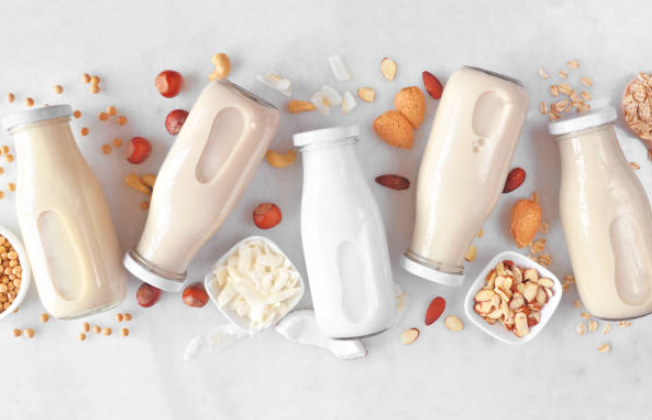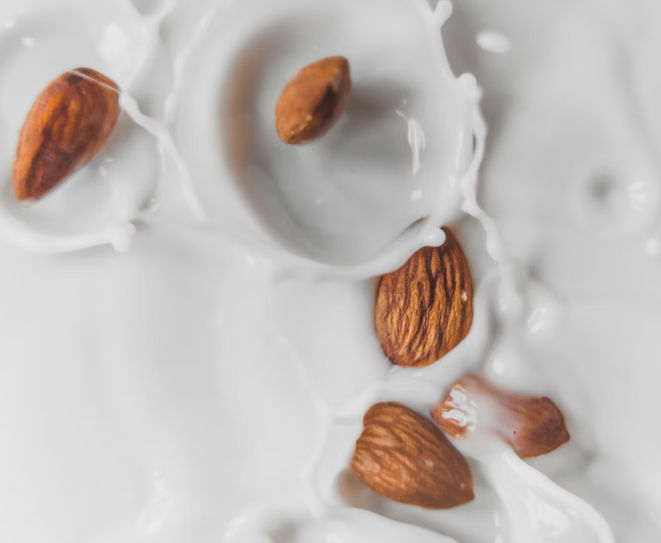Remember in the 90s, when the only alternative milk options were rice and soybeans? We’ve come a long way since then. Almonds, oats, hemp, macadamias, hazelnuts… Seriously, what can’t be milked? While it seems like a new type of alternative milk is being invented every month, almond milk has always been the most popular choice for Americans, but is almond milk good for you?

It’s a fair question. Just because something is popular doesn’t mean it’s necessarily healthy. (Remember when everything from frozen yogurt to potato chips had the word “fat-free” printed on their packaging?) Here, a registered dietitian makes a judgment on whether almond milk is healthy and how it compares to other popular alternative milk options.
Is Almond Milk Good for You?
According to registered dietitian Jenny Beth Kroplin, RD, almond milk can be healthy, but it depends on what brand you buy. “Plant milks are very popular, but that doesn’t mean they’re actually healthier. In fact, some plant-based milks are full of artificial ingredients that are not good for health,” she said. “Not all almond milk is created equal, and choosing healthy almond milk can be tricky. This is where reading ingredient labels is very important.”
Cloplin explains that some almond milk is high in sugar, contains various gums (which some people find irritate the gut), and may contain filler ingredients, often used for mixing and thickening.
In terms of how almond milk compares to other types of alternatives, registered dietitian and formula developer Julie Andrews (MS, RDN, FAND) says that each type of milk has its own advantages and disadvantages. For example, she says almond milk tends to be low in protein and is not naturally a good source of calcium and vitamin D (although some almond milk is fortified for nutrient density). In contrast, she says cow’s and soy milk are higher in protein.
However, almond milk does have health benefits, which are explained in more detail below.

What are the health benefits of almond milk?
1. Low Calorie
Both dietitians point out that almond milk is lower in calories than oat milk and soy milk, so if losing weight is one of your health goals, storing almond milk in the refrigerator may help.
2. Low Carbs
Cliplin and Andrews also say that almond milk contains fewer carbohydrates than oat milk, which is another reason why almond milk can be a good alternative to milk if you want to lose weight. Each cup of oat milk contains 16 grams of carbs, while almond milk contains less than 1 gram of carbs. It is also lower in carbohydrates than soy milk, which contains about 4 grams of carbohydrates per cup.
3. Contains Vitamin E
Andrews says almond milk contains vitamin E, which comes directly from the nuts themselves. Vitamin E is an antioxidant that helps protect the body from free radicals, which in turn helps protect the body from disease. One cup of almond milk contains about 3 mg of vitamin E. (Generally, your goal is 15 mg per day.)
4. Contains Calcium and Vitamin D

Kroplin says that if you buy fortified almond milk, it will contain calcium and vitamin D, which is especially helpful for people who don’t consume dairy and may not be getting enough of these nutrients. One cup of fortified almond milk contains 173 mg (your goal is 1,000 mg per day) and 37 IU of vitamin D (aim for 600 IU per day).
5. Almond Milk Supports Heart Health
Drinking almond milk regularly can help support cardiovascular health, says Cleplin says. This is because almonds have been linked to a lower risk of heart disease and lower cholesterol levels.
It’s worth reiterating that not all almond milk is created equal, so it’s important to read the label to make sure the almond milk you choose is as nutritious as possible. Clopling recommends choosing unsweetened almond milk (so there is no added sugar) and a long ingredient list without fillers, gum, and other non-nutrient-free ingredients.
Andrews again says that all types of milk have their own benefits, so the best milk for you depends on your health goals, overall diet, and of course, the taste you prefer. Be sure to compare labels to find milk options that meet your individual needs. I recommend choosing milk that is rich in protein, fat, vitamins and minerals and low in sugar. She said.
